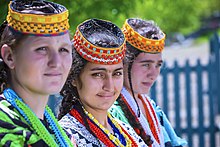کالاشلار
 Kalash women | |
| اهالی ساییسی | |
|---|---|
| ca. 4,100[۱] | |
| چوْخلی اهالی اولان بؤلگهلر | |
| Chitral District, پاکیستان | |
| دینلری | |
| Mixture of paganism, animism, ancestor-worship, nature worship, worship of deities, fire and idols,[۲][۳][۴][۵][۶][۷] some have converted to ایسلام[a] |
کالاشلار (اینگیلیسیجه: Kalash people، عربجه: قبيلة الكيلاش، آنادولو تورکجهسی: Kalaşlar، فارسجا: کالاش) - بیر قومی گروه چوْخلاری پاکیستان دا یاشاییرلار.
گؤرونتولر[دَییشدیر]
قایناقلار[دَییشدیر]
- ^ 2013 Census Report of CIADP/AVDP/KPDN. (2013). Local Census Organization, Statistics Division, community based initiatives .
- ^ قایناق خطاسی برچسب
<ref>نامعتبر؛ متنی برای ارجاعهای با نامSearle2013وارد نشدهاست - ^ قایناق خطاسی برچسب
<ref>نامعتبر؛ متنی برای ارجاعهای با نامCamerapix1998وارد نشدهاست - ^ قایناق خطاسی برچسب
<ref>نامعتبر؛ متنی برای ارجاعهای با نامSheehan1993وارد نشدهاست - ^ قایناق خطاسی برچسب
<ref>نامعتبر؛ متنی برای ارجاعهای با نامWest2010وارد نشدهاست - ^ قایناق خطاسی برچسب
<ref>نامعتبر؛ متنی برای ارجاعهای با نامBezhan2017وارد نشدهاست - ^ Minahan, James B. (10 February 2014). Ethnic Groups of North, East, and Central Asia: An Encyclopedia (in English). ABC-CLIO. p. 205. ISBN 9781610690188. 26 June 2016-ده یوخلانیب.
Living in the high mountain valleys, the Nuristani retained their ancient culture and their religion, a form of ancient Hinduism with many customs and rituals developed locally. Certain deities were revered only by one tribe or community, but one deity was universally worshipped by all Nuristani as the Creator, the Hindu god Yama Raja, called imr'o or imra by the Nuristani tribes. Around 700 CE, Arab invaders swept through the region now known as افغانیستان, destroying or forcibly converting the population to their new Islamic religion. Refugees from the invaders fled into the higher valleys to escape the onslaught. In their mountain strongholds, the Nuristani escaped conversion to Islam and retained their ancient religion and culture. The surrounding Muslim peoples used the name Kafir, meaning "unbeliever" or "infidel," to describe the independent Nuristani tribes and called their highland homeland Kafiristan. The Nuristani are sometimes called Kalasha though this name is more appropriate for the closely related Kalash in the neighboring Chitral region of Pakistan. The differences between the Nuristani and the Kalash are religious as the Kalash mostly retain their ancient religious beliefs.
{{cite book}}: CS1 maint: unrecognized language (link) - ^ Pakistan Statistical Year Book. 2012. Pakistan Bureau of Statistics. Karachi: Manager of Publications
قایناق خطاسی برچسب <ref> برای گروهی به نام «lower-alpha» وجود دارد، اما برچسب متناظر با <references group="lower-alpha"/> یافت نشد.





